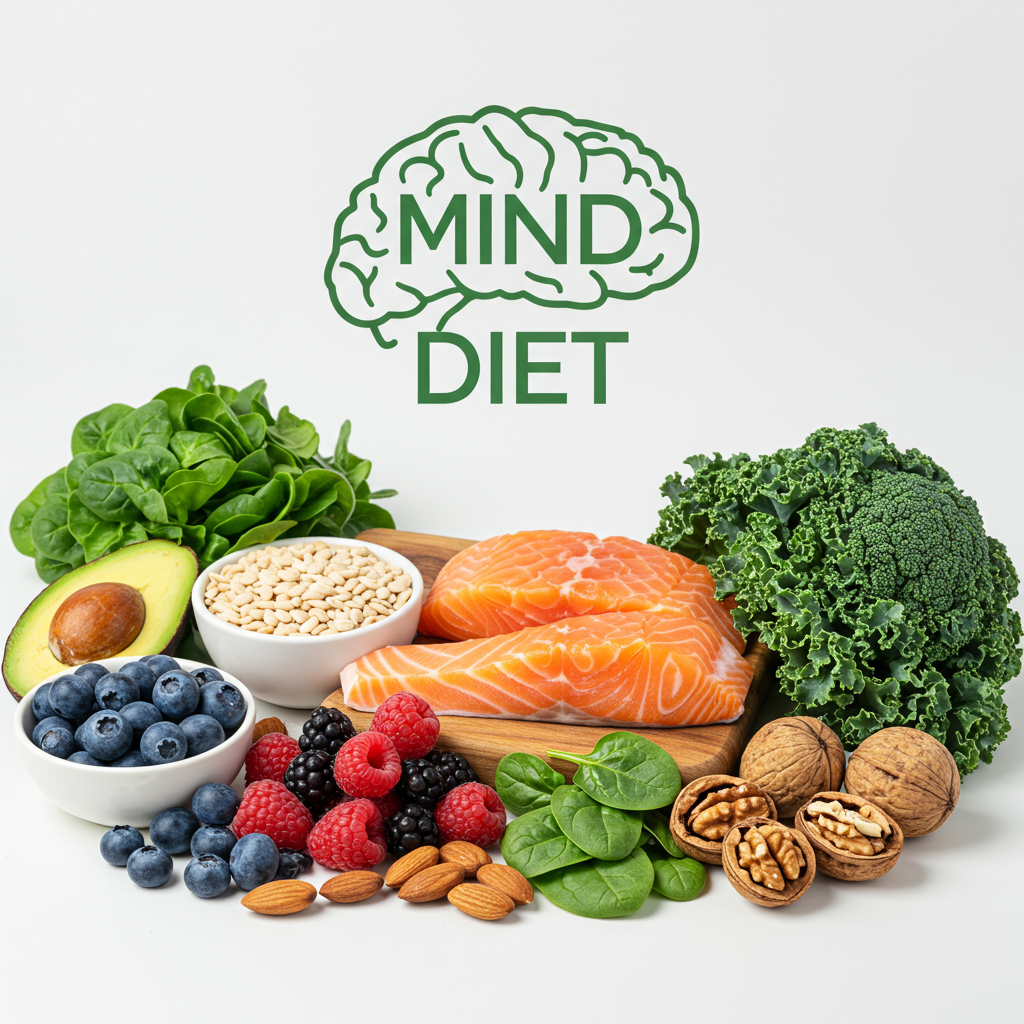Concerned about cognitive decline or simply seeking ways to enhance your brain function as you age? Discover the powerful connection between what you eat and the health of your brain! Nutrition plays a critical role in supporting neurological well-being, potentially reducing the risk of conditions like Alzheimer’s disease and improving memory and focus. This guide explores the science-backed MIND diet and shares two delightful recipes designed to nourish your mind, bringing together the best ingredients for optimal cognitive vitality.
What is the MIND Diet, and Why Does it Matter for Your Brain?
The MIND diet is not just another fleeting food trend. Its name is an acronym for Mediterranean-DASH Intervention for Neurodegenerative Delay. This dietary pattern thoughtfully combines key elements from two highly regarded eating plans: the heart-healthy DASH (Dietary Approaches to Stop Hypertension) diet and the traditional Mediterranean diet. However, the MIND diet specifically focuses on foods shown in research to benefit brain health.
Studies offer compelling evidence for the MIND diet’s impact. For example, following this pattern closely for around five years has been linked to a significant reduction – up to 53% – in the risk of developing Alzheimer’s disease. Even moderate adherence showed promising results, including a 35% lower risk of overall cognitive decline and improvements in memory function. These findings highlight the potential for dietary choices to play a preventative role in maintaining sharp cognitive abilities throughout life.
Core Principles of the MIND Diet
Unlike restrictive diets, the MIND diet emphasizes incorporating specific brain-boosting foods into your daily meals while limiting less beneficial options. Its effectiveness stems from favoring nutrient-dense ingredients rich in antioxidants, vitamins, healthy fats, and fiber. These components work synergistically to combat inflammation and oxidative stress in the brain – processes believed to contribute significantly to neurodegenerative diseases.
Key food groups to focus on include:
Leafy green vegetables (at least six servings per week)
Other vegetables (at least one serving per day)
Berries (at least two servings per week)
Nuts (at least five servings per week)
Olive oil (as the primary cooking oil)
Whole grains (at least three servings per day)
Fish (at least one serving per week)
Beans (at least four servings per week)
- Poultry (two servings or less per week)
- www.ucihealth.org
- www.ucihealth.org
- www.ucihealth.org
- www.ucihealth.org
- www.ucihealth.org
Foods to limit on the MIND diet include red meats, butter and margarine, cheese, pastries and sweets, and fried food. By reducing intake of saturated fats and processed items, this approach also supports cardiovascular health, which is intrinsically linked to brain health.
Fueling Your Brain with the Right Ingredients
The power of the MIND diet lies in the specific nutrients provided by its recommended foods. Many ingredients are packed with compounds known to protect brain cells and support neurotransmitter function. For instance, foods high in omega-3 fatty acids, antioxidants like flavonoids and polyphenols, and B vitamins such as folate and B12 are particularly beneficial.
Incorporating these ingredients into your meals doesn’t have to be complicated. Simple, flavorful recipes can make brain-healthy eating a delicious and sustainable habit. Chef Jessica VanRoo, executive chef at the Susan Samueli Integrative Health Institute at UCI Health, has developed delightful dishes that align perfectly with MIND diet principles, proving that good-for-you food can also be incredibly satisfying.
Let’s explore how specific components in these recipes contribute to cognitive vitality, based on insights from experts like registered dietitian Katie Rankell, program director of the UCI Health Weight Management Program.
Brain-Boosting Bites: A Nutrient-Packed Frittata
Imagine a vibrant, flavorful dish that’s easy to prepare and supports your long-term neurological health. That’s exactly what you get with a spinach and white bean frittata featuring turmeric and tomatoes. This recipe exemplifies how simple ingredients can deliver a powerful punch for brain health.
Eggs, a star ingredient, are one of nature’s best sources of choline. This vital nutrient is essential for creating acetylcholine, a crucial neurotransmitter involved in memory, mood regulation, and muscle control. Sufficient choline intake is linked to better cognitive performance and may help shield against age-related memory decline. Eggs also provide B vitamins, including B12, which helps keep levels of the amino acid homocysteine in check. Elevated homocysteine can damage blood vessels and has been associated with increased risk for conditions like stroke, dementia, and Alzheimer’s.
Spinach contributes to the brain-boosting profile. As a leafy green packed with folate, vitamin K, and lutein, it has been connected to slowing cognitive decline and enhancing memory function. These benefits are attributed to spinach’s ability to reduce inflammation and oxidative stress within the brain.
Adding white beans introduces magnesium, a mineral crucial for nerve transmission and neuroplasticity – the brain’s ability to adapt and form new connections. White beans also provide plant-based protein, iron, and complex carbohydrates, promoting stable blood sugar levels. Steady blood sugar ensures a consistent energy supply for optimal brain function.
The spice cabinet offers turmeric, a powerful brain ally. Its active compound, curcumin, is renowned for its potent anti-inflammatory and antioxidant effects. Research is exploring curcumin’s potential to improve mood and offer protection against neurodegenerative conditions like Alzheimer’s disease.
Finally, tomatoes add valuable antioxidants like lycopene and beta-carotene. These compounds target free radicals, unstable molecules that can harm brain cells, thereby supporting the integrity of your brain’s cellular structure.
Socca: A Flavorful Flatbread for Cognitive Health
This vibrant flatbread recipe, drawing inspiration from various corners of the Mediterranean region, offers another delicious way to nourish your brain. It features socca, a rustic chickpea flour flatbread, topped with roasted vegetables and a fragrant chermoula sauce.
At the core of the socca itself is chickpea flour. This plant-based protein source is high in fiber and folate (vitamin B9). Folate is indispensable for neurotransmitter function and DNA repair – processes critical for maintaining brain performance and lowering the risk of age-related cognitive decline. Chickpeas also supply iron and magnesium, supporting oxygen delivery to the brain and healthy nerve signaling.
The roasted vegetables topping – think red bell peppers, zucchini, mushrooms, and red onions – bring a wealth of antioxidants, vitamins, and polyphenols. These compounds work to lower oxidative stress and inflammation in the brain. Red bell peppers are particularly rich in vitamin C and carotenoids, offering protection for brain cells. Mushrooms are being studied for their potential role in supporting nerve growth factors and have been linked in some research to a reduced risk of mild cognitive impairment.
The chermoula sauce elevates the dish and its brain benefits. This aromatic blend often includes herbs like parsley and cilantro, which are high in flavonoids and vitamin K – nutrients associated with slowing cognitive decline. They also contain luteolin, a compound shown to reduce age-related brain inflammation. Garlic and lemon contribute antioxidants, while spices such as cumin, paprika, and coriander add flavor depth along with anti-inflammatory properties that support brain health. Even Kalamata olives provide healthy fats and polyphenols known to protect neural tissue. If you opt for a sprinkle of feta cheese as a garnish, you’re adding calcium and vitamin B12, both vital for nerve function and mental clarity.
Registered dietitian Katie Rankell notes that this plant-based, pizza-like creation is a family-friendly option that nourishes both body and mind.
Making Brain-Healthy Eating Accessible
Adopting a brain-healthy eating pattern like the MIND diet is an investment in your future self. It doesn’t require complicated techniques or exotic ingredients. As these recipes from UCI Health demonstrate, you can prepare delicious, satisfying meals using everyday foods found at your local grocery store. Focusing on incorporating more leafy greens, berries, nuts, beans, whole grains, fish, and olive oil while reducing less beneficial foods is a practical approach. Think of it as building a foundation for resilience in your brain. Consistent adherence over time is key to reaping the full benefits, contributing to cognitive vitality and potentially delaying age-related decline.
Frequently Asked Questions
What is the MIND diet and how does it benefit my brain?
The MIND diet is a hybrid of the Mediterranean and DASH diets specifically designed to support brain health. It emphasizes foods rich in antioxidants and anti-inflammatory compounds like leafy greens, berries, nuts, beans, whole grains, fish, and olive oil, while limiting foods high in saturated fat and sugar. Research suggests that consistently following the MIND diet can significantly lower the risk of cognitive decline and Alzheimer’s disease by reducing inflammation and oxidative stress in the brain.
What specific ingredients are highlighted in these brain-boosting recipes?
The recipes feature ingredients like eggs (rich in choline and B12, vital for memory and nerve function), spinach and white beans (providing folate, magnesium, and fiber), turmeric and tomatoes (packed with powerful antioxidants like curcumin and lycopene), chickpea flour (source of folate and plant protein), and herbs and spices (like parsley, cilantro, cumin, paprika with anti-inflammatory and antioxidant properties). These components contribute essential nutrients known to support brain cell health and communication.
Where can I find more recipes or resources about the MIND diet from experts like those at UCI Health?
The recipes discussed were developed by Chef Jessica VanRoo from the Susan Samueli Integrative Health Institute at UCI Health, with insights from Registered Dietitian Katie Rankell from the UCI Health Weight Management Program. UCI Health offers various resources on health and wellness. Exploring their website or related publications might provide access to more brain-healthy recipes and information from their experts on topics like nutrition, weight management, and integrative health approaches.
Conclusion
Nourishing your brain is a lifelong journey, and the food you eat plays a pivotal role. The MIND diet offers a well-researched, practical framework for making dietary choices that prioritize cognitive health. By focusing on nutrient-dense foods and limiting less beneficial ones, you can actively work to reduce inflammation, combat oxidative stress, and support the complex processes that keep your brain sharp. Recipes like the vibrant frittata and the flavorful socca featured here provide tangible, delicious examples of how easily you can incorporate these brain-boosting ingredients into your daily life. Start exploring these recipes today and take a significant step towards enhancing your cognitive vitality for years to come.



